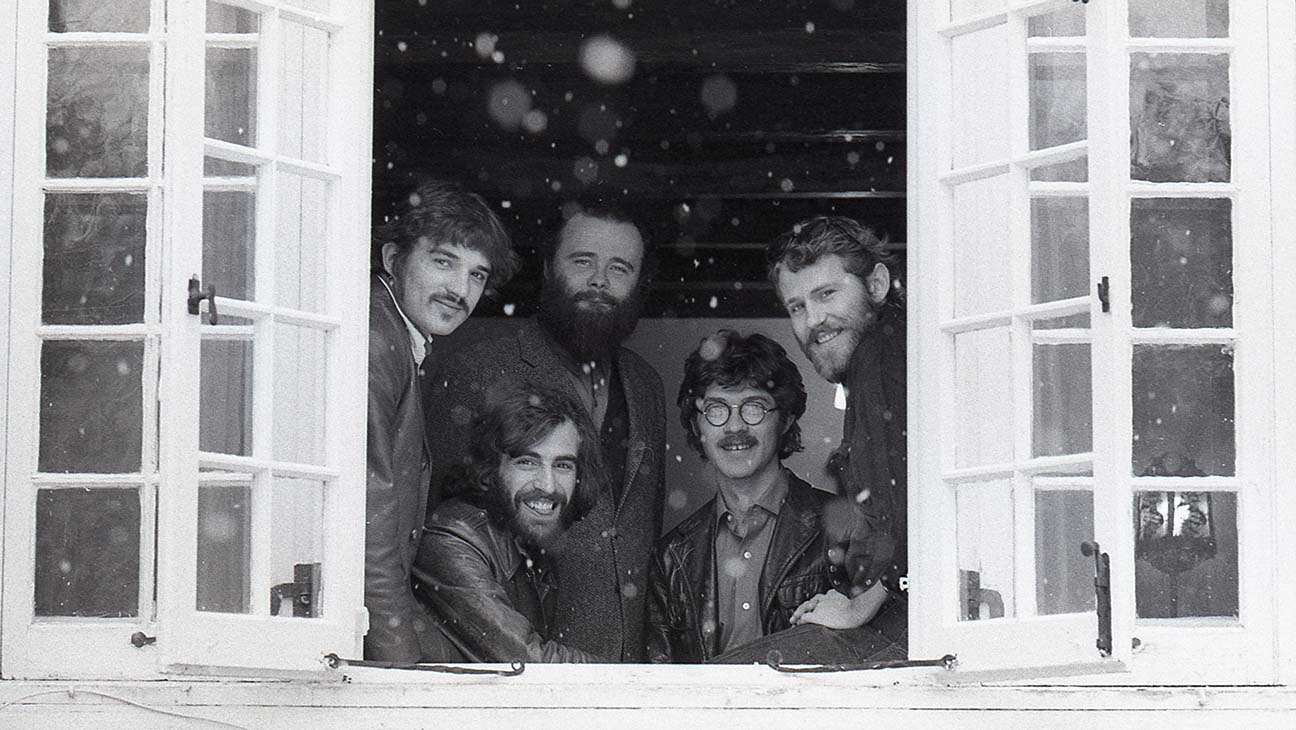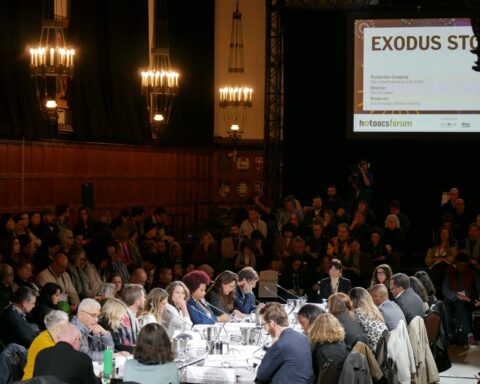What is the future like for Canadian documentary producers? It’s a topic that’s evergreen for the Documentary Organization of Canada (DOC) and all independent filmmakers in this country.
We have a difficult funding system overseen by the Canadian Radio-Television and Telecommunications Commission (CRTC), which is trying once again this year to address the many concerns raised by its clients, which includes the documentary community. One of the major areas under review are streaming services, which are, ironically, benefitting from the current COVID-19 crisis. The pandemic, of course, has added even more layers of concern to documentary’s fragile structure.
POV contacted two documentary producers to address some of the pressing issues of the day. Peter Raymont is a veteran producer, director and CEO of Toronto’s White Pine Pictures, which celebrated its fortieth anniversary last year. As Raymont wrote to POV: “We’ve produced dozens of documentary films and series over the years, and have been honoured with an Emmy Award, plus four Emmy nominations, the Sundance Audience Award, two Oscar shortlists, DGC awards, and Genies, Geminis and Canadian Screen Awards.” Among their recent hits are Once Were Brothers: Robbie Robertson and the Band, Toxic Beauty, and Margaret Atwood: A Word after a Word after a Word is Power. Andreas Mendritzki is a Montreal-based producer and co-founder of GreenGround, a young company which produced, in one year, Tao Gu’s Taming the Horse, Laura Bari’s Primas, and Jacquelyn Mills’ In the Waves.
POV hopes that this article can start an on-going online discussion about these and other issues, with many diverse members of the documentary community weighing in with their opinions. – Marc Glassman, POV editor
PR: Peter Raymont
AM: Andreas Mendritzki
POV: Marc Glassman
POV: COVID-19 is affecting us all, personally and professionally. What are your thoughts about how the pandemic will change the documentary world?
AM: I heard a journalist who had been living in New York during the early 2000s and had extensively written about 9/11 remember that everyone was saying “everything will be different after this,” and while some specific things did change dramatically, most of the day-to-day did not. I suspect it will likely be the same with this event. It’s certainly expediting the already entrenched migration of eyeballs towards OTT (over-the-top media) platforms and away from other forms. Is it the final nail in the coffin for theatrical, as I’ve seen predicted? I suspect not. I know it will be easier to get participants to record themselves over video chats when needed now, as everyone has become a Zoom expert!
PR: Curiously, I’ve found that the physical distancing we are all experiencing has led to emotional sharing, with filmmakers across the country and around the world reaching out to one another as never before. One would hope that this will foster new collaborations and partnerships. Time away from our offices has also encouraged people to go online and screen films they might have missed, which are now being made available by streaming services and online film festivals. This has allowed us to get to know each other’s work, gaining a deeper appreciation of each other’s films and accomplishments.
POV: Let’s talk about the funding climate in Canada—at least before the present crisis. Peter, what was it like when you started?
PR: When I became an independent producer in 1978, the sources for funding were the CBC, NFB, and TVO. Telefilm Canada, then called the Canadian Film Development Corporation (CFDC), had been created to support the production of dramatic feature films. Documentary production was not considered a viable business.
Partially because of my experience working with the Film Board in Montreal, and a bit with the CBC in Toronto, I was fortunate to get their financial backing for some of my first films as an independent, History on the Run, Magic in the Sky, and With our own Two Hands.
Barri Cohen reminded me recently that Stan Fox was the person she pitched at TVO for The World Is Watching, the breakout film that Harold Crooks, Jim Munro, and I made in Nicaragua. No “Canadian content” other than that the filmmakers were Canadian. It was a Canadian perspective on a dramatic world event. It’s much more difficult to get Canadian funding for that type of film now.
AM: Despite all of the weaknesses and flaws within the Canadian financing system, we can still be very proud of the public support the industry receives. I feel very lucky to be working within the system, where places like the Arts Councils and the Film Board and agencies like SODEC and Telefilm invest serious money into this country’s cultural production. Of course, I think they need to be investing more, and taking more risks, but I count us lucky nonetheless. I think the way the Canadian financing model continues to be so centrally reliant on broadcaster participation is a mistake. Broadcasters have had to be on their back foot, in a defensive position since the migration of eyeballs to streaming platforms. To continue to have their involvement be the key to unlocking multiple other sources of funding leads to a cascade of “defensive” decisions being made, stifling the kind of risk taking that leads to innovation (and I’m talking both about film content but also about market outreach approaches as well). I certainly believe that a huge importance needs to be placed on ensuring that films don’t just get made but get seen. We should be much more diverse in our approach to reaching audiences, and less broadcaster-reliant in our financing model.
POV: Andreas, what would you want to see changed in our funding setup?
AM: We live in a country that overtly advertises itself, from the PMO down, as a multicultural globally aware place, and yet it is so critically difficult to make work that is not in French or English. (One must critique here not only the broadcasters for their allergy to subtitles, but also Telefilm and its ridiculously outdated language policy.) My generation doesn’t give a damn about whether the content we’re watching is subtitled or not. Have you ever watched anything on Instagram TV? Half the content from places like Vice is subtitled even when it’s in English! Reading subs is easy now in the age of UHD and Retina screens. The faster Canadian market partners start programming the best content, regardless of language, the better chance they have of not losing out to the international content creation-dissemination juggernauts.
PR: There was a period in the early-mid 1980s when my fledgling company, Investigative Productions, was getting regular documentary commissions and license fees from the wonderful Alan Fountain at Channel 4 in London, UK. Fountain’s refreshing programming philosophy was to “let a hundred flowers bloom” all over the world. The documentaries he commissioned didn’t have to fit a “strand.” They just had to be the passion project of the filmmaker. Viewership was high. People responded to the “many flowers” he supported in Africa, Asia, the Middle East, and Canada. It was kind of crazy that some of our films made at that time were better known in the UK than here at home in Canada.
POV: Would more foreign investment help Canadian docs?
AM: We did have some private investment from China in Taming the Horse, for example, which is a film about a young Chinese man in Mandarin shot in China. We managed to secure a serious investment from an international NGO for one of our shorts that was shot in Kenya. I think there’s just such a wealth of talent in Canada, and again, a robust financing model, we just need some of the stakeholders to be a bit more risk-taking when it comes to ensuring that productions with international appeal don’t get dismissed out of hand.
PR: It seems that the current commissioning and programming decisions by mainstream Canadian broadcasters are less “political,” whereas I think there remains an appetite for boldly political documentaries in Europe.
POV: With mainstream broadcasters still being so conservative, what platforms do you pursue?
AM: I still hope that some of the more niche platforms with more “aggressive” programming will gain enough market share to be sustainable. Programming taste aside, there is the question of programming CanCon, appropriate taxation of these platforms and the mandating of investments in new Canadian content. As is the case with most of my peers with whom I have had conversations, I believe that there needs to be more government intervention to promote (through one mechanism or another) creation and distribution of Canadian content. I can appreciate that from the government’s point of view, these negotiations are not easy. But one has to assume that each year that goes by these negotiations are just going to get harder and harder.
PR: OTT subscription streaming platform are the most exciting entertainment programmers today. They have huge resources/millions of subscribers and are licensing many documentaries from around the world. They seem willing to take risks. Hulu is a particularly good partner for Canadians as it currently can only be received in the US, so one can have a Canadian broadcast partner, Hulu in the US, and the rest of the world is available for further licenses. We currently have two documentary features licensed as “Hulu Originals,” Once Were Brothers: Robbie Robertson and the Band (licensed to Hulu by our distributor, Magnolia Pictures), and Margaret Atwood: A Word after a Word after a Word is Power, which White Pine Pictures licensed to Hulu directly. Netflix has much bigger resources and buying power but has tended to require a license for the world, though there are exceptions. And there is Amazon and Apple. In Canada, there’s Bell Media’s subscription streaming platform Crave and CBC’s Gem, which are now licensing separate from the broadcast platforms, while also streaming programmes originally licensed for broadcast.
POV: When you produce, do you think about the power of documentaries and where they can lead us?
PR: I think documentaries can shift people’s feelings and opinions, open them up to realities they may not have otherwise considered, and “move the needle” on public perceptions and opinions. The documentary has had a glorious past and promises to have an even more promising future. In this time of so-called “fake news,” “alternative truth,” and “constructed reality,” people are desperate for information they can trust and are drawn to a creative and sensitive presentation of reality.
AM: People are producing and consuming more and more content, and I don’t see any signs of us becoming uninterested in this realness as either a vehicle or content for our stories. As our various struggles and dreams become ever more shared experiences, we will, I think, turn all the more to documentary as a universal medium for working out, challenging, and celebrating those dreams and struggles. I think it’s a crucial tool for helping humans build and maintain empathy for one another, something that is all the more important in an age where our digital and physical proximity to one another is shrinking, causing us to realize our differences as much as it is doing anything else more positive.
POV: Are documentaries evolving, becoming more receptive than ever to new voices, feelings and attitudes?
PR: There are many more opportunities for filmmakers who are female, Indigenous, diverse in origin, and LGBTQ than when I started.
AM: If there is a roadblock to ensuring diverse voices are being heard, it’s from the distribution/broadcast end and not from the production/ financing end. A line that we heard a lot when shopping around Laura Bari’s Primas was, “Great film, but we already did a #MeToo film,” as if violence against women was an issue that had been dealt with and solved and no longer needed public discussion. I really think that we need to have more faith in the appetite of our audiences. I really believe that if the film is good, most people will sit it through and appreciate it, even if the subject matter or approach is challenging.
I’d love to live in a world where I could say that anyone has the right to tell any story—a sort of Herzogian ideal—but in practice this is simply not the case. It is too easy to commit fundamental misrepresentations, and too easy for the mechanisms of production and distribution to be inherently biased towards historically privileged communities and points of view. It is imperative that we strive to ensure that the stakeholders of a given issue or story have a real concrete stake and say in how, when, and why their stories get told, and this is especially true for peoples that have been historically underrepresented.
PRIMAS, a film by Laura Bari – Trailer from Les Films du 3 Mars on Vimeo.
PR: In the right hands, I think this can be done sensitively by any doc-maker and in collaboration with local filmmakers, journalists, consultants, advisors and those that help provide access.
AM: One can pick at this argument by staking smaller and smaller concentric circles around an issue until we say that no one can make anything other than an autobiographical film, which would clearly be a loss for us all. Perhaps the crux of this question in the context of doc making should be slightly different, and not just about a creator of culture “X” making a film about culture “Y.” A doc is often set up as a function of subjugation in and of itself: the director and the subject. I think that it’s incumbent upon filmmakers to do their best to empower their subjects to be real creative stakeholders in the filmmaking process. It’s a potentially challenging thing to do in practice, and often must be worked at willfully at all stages of production.
POV: What advice would you give to producers?
PR: Follow your heart but don’t lose your head. I think programmers and funders are attracted by passionate filmmakers who care deeply about the film they want to make. Sometimes the timing is not right and broadcasters are not ready for a unique approach to a subject they may be tackling in another part of their organization, but don’t give up. And have two or three arrows in your quiver, so you won’t be devastated when one of them is turned down. More and more in North America, I think broadcasters like to hear directly from filmmakers, whereas elsewhere, producers are more important.
AM: I’d tell them that the biggest challenge for those not making Tiger King for Netflix remains how to get our content seen. Appetites for docs are higher than ever, but there’s just so much high-quality content out there. It’s created a ferocious competition that means that a great many good films barely see the light of day. Take the festival circuit: While there has been a proliferation of festivals in the last twenty years, many mid-level festivals choose to primarily re-program the top hits of the bigger fests. If you manage to get a good festival launch you might end up with a fairly wide reach by the time your run has ended. But if you, for whatever reason, aren’t so lucky with your premiere, there aren’t that many mid-level festivals that are going to take a risk on your film, and consequentially it dies. And it’s the same idea with many other outlets, such as OTT or theatrical.
The marketing of Canadian films is underfunded, not the production. I think it’s about OTTs and broadcasters being enticed or even forced to take more risks. It’s about ensuring that the cultural investment organisms in this country are funding the marketing of our content in a way that adequately gives their production investments a fighting chance. And it’s about producers and distributors spending that money smartly. We have an unprecedented ability to identify and communicate with our core audiences and communities with online tools and we need to be sharing knowledge about those tools as a community of filmmakers so as to collectively do a better job at this.














